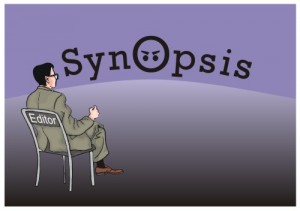Blogger: Mary Keeley
I talked to two writers this week who were struggling to get the synopsis for their books right. I understand the challenge. Knowing what is necessary to include and what isn’t can feel more like an obscure gray blend than clear black or white, partly because you are so close to the story and the weaving of characters and events. Now might be a good time to review a few tips on writing the dreaded synopsis. It’s your first impression, which is why it’s so important. As the saying goes: You have only one chance to make a first impression.
This checklist will help you to avoid key downfalls and perfect your synopsis.
_____ I address publishing professionals, not readers. That is, you don’t leave any unanswered questions or a cliffhanger ending that you would have when trying to grab readers’ attention.
_____ The first paragraph has a strong hook to grab the agent’s or editor’s immediate interest.
_____ It is written in the same style and voice as the story.
_____ I introduce the main characters and describe their main conflicts and goals in a way that will make agents and editors like and care about what might happen to them. Showing that you can accomplish this in the synopsis promises that you can do this successfully in the book as well, and they’ll want to continue reading.
_____ I stick to the main plot and characters, following their story (emotional arc) and the plot (narrative) chronologically. I don’t get sidetracked with sub-plots and secondary characters. Again, showing you can focus on the emotional journey of your characters through the main plot to final resolution in your synopsis gives the agent or editor the initial impression that you can deliver in the book as well.
_____ My transitions from paragraph to paragraph are smooth and easy to follow. This is where many a synopsis fails. If there is confusion between what was happening in the previous paragraph and the next one, or if important details are missing, agents and editors are prone to reject the proposal because you’ve given us the impression that your main plot isn’t clear to you. This might not be accurate, but we don’t have time to read the whole manuscript to find out.
_____ I tell the ending. Agents and editors need to see that you are able to bring all the conflicts to final, satisfying resolution.
_____ It is free of any GPS (grammar, punctuation, and spelling) errors. If you aren’t sure about this, get help. Several of these errors in a synopsis give the impression that you aren’t ready for publication.
If you continue to struggle with your synopsis, it might indicate a problem in the story that you need to address. But the beauty of writing the dreaded synopsis is in identifying this before you begin submitting your book proposal or contest entry.
What pitfalls can you identify in your current synopsis? How can you remedy them as a result of these tips? What had you already done well? Noting this is good too because it boosts your confidence.
TWEETABLE:
The dreaded synopsis. There is so much at stake. This checklist will help you to do it well. Click to Tweet.

 The Author’s Voice
The Author’s Voice
I can write a good synopsis–in my business voice. I do it often on my day job: the high points of an article or presentation, 1-2-3, just the facts.
* Writing it in the same voice and style as my WIP is the challenge. As I work at it, I’ve noticed a slight shift in my business voice. So far, my colleagues at work have not complained about my livelier email style.
Hi Shirlee,
It sounds like you use a different side of your brain for work versus writing and now you’re blending them. Nice! I’m sure your colleagues are enjoying the transformation.
Shirlee, I can so relate. I just submitted an article that had my novel voice all over it. 🙂
I tend to write a long synopsis. When I first started writing, I thought a synopsis was just about the plot. I’m trying to focus on how the plot affects the main characters now.
Thanks for the reminder to follow the emotional journey. I’m going to save your notes for the next synopsis I write. Thanks.
Jackie, I hope the checklist will be helpful for your next synopsis-writing experience.
I’m fairly certain that synopsis is Greek for “let’s see how many times I can yell at the laptop and then email things to Significant People who seem to think a dash is a bad thing…al-though-I-don’t-think…I overused them…or the ellipsis…much-at all.”
Thank you for this, Mary. I’m going to copy and paste this into a Word doc and file it away for the next time I write one of these things.
LOL… Thank you for that definition. I’ve decided not to think about the topic for now. I do not want another discouraging factor.
Jennifer, your humor is welcome relief for this topic that stresses writers.
Part of my final edit includes eliminating as many … and — as possible. 🙂
Lori, I also struggle with the word ‘and’. What I’ve been doing with my WIP is cut the sentence short or restructure. It takes time, and breaks the ‘don’t edit until you finish’ rule, but I have to do it.
Mary, you have written a post that I am going to bookmark! The word “dreaded” doesn’t even touch it.
I have my list of agents to query and I avoid those that request a synopsis up front.
I think I know what I need to do today.
I’m glad it’s helpful to you, Sheila. Happy synopsis writing.
I’m working on a non-fiction proposal, but this is still the section I’m avoiding most! It’s hard to decide what is important to include and what can be saved for the book.
Becky, except for memoirs, a proposal for a nonfiction book calls for something different: a paragraph or half-page Overview of the book’s unique purpose and goal for the reader plus a chapter list for the whole book with short paragraph descriptions of each chapter.
I don’t dread the synopsis, but I’m still learning the fine art of not just telling the events of the story, but writing it in the voice that will make the synopsis more interesting to those who read it. 🙂
*Susan May Warren teaches to write the synopsis like a police report, each character “reporting” the main events of the story (the obstacles that make it harder to achieve their goals). That has helped me know what to include in my synopsis. Now to make sure it doesn’t SOUND like a police report, and may synopsis should be pretty good. 😉
First approaching the synopsis like writing a police report to get all the main plot action down in consecutive order and then going back to fill in the motivations that propel the action is a good suggestion, Jeanne. I can see that it might help writers to avoid meandering to a subplot.
I don’t know if this will help anyone, but I write the synopsis as if I were condensing the story for a teenager who’s mildly interested but will never take the time to read the whole thing.
* It therefore has to be engaging, ‘bright’ (in the sense of polished and enjoyable), and fast-paced, with no telegraphing of the ending.
* It’s a fun exercise, another aspect of the storytelling art.
Another thought…take a story you know well, one you didn’t write, and write a synopsis for it.
* May I suggest The Life Of Jesus? Tell His story as if you’re relating it to someone who has never heard of Him, and build in all of the suspense, sorrow, and triumph that the story really has.
* There’s a trick here, and it will work for your own work. Don’t use reverential language. It’s tempting, but if you can pull back from the temptation to see the story itself through ‘worshipful’ eyes and simply give the powerful narrative, so to will you begin to learn not to be reverential toward your OWN work…because, I think, that is the pit into which most synopses fall…that of a certain self-consciousness that is the close cousin of pride.
Words of Wisdom. Thank you Andrew.
Thank you, Mary, I’ve already bookmarked this helpful post.
* Can anyone recommend a great “how to book” for writing a synopsis so I can highlight, dog ear and refer back to the pages as needed. I’m such a visual person.
Lara, I’m glad the checklist is helpful. Regarding how-to books on writing a synopsis, I haven’t read Cathy Yardley’s book, Rock Your Query, but it received good reviews on Amazon. You can do a search there for “books on writing a synopsis” and see additional titles as well.
Thanks, Mary. As always, this blog is helpful no matter what stage your writing process is at.
Very helpful post, Mary. I’m sharing this around the writer-sphere!!
Thanks, Teresa. It’s good to know this was helpful.
I’ve written a one-page synopsis for my current MS, but I need to work on a longer one. Writing such a small summary with the same voice is so hard … which makes it all the more important to limit what you include and what you don’t include. Leave room for your voice. Oh, so hard. 🙂 I definitely only include my main plot points on the shorter synopsis … the longer one gives you room to add a little more voice-on-the-detail.
True, Shelli. Sticking only to what is relevant to the main plot on the four- to five-page synopsis is the challenge, don’t you think? It can be tempting to fill space by straying into secondary character action instead of focusing on the main character’s emotional journey, which moves the main plot along.
Mary:
I love this post. And I’d like to voice my support for the short synopsis! I hated producing the first couple, but realize now how important they are to actually understanding my story. Early on, I just wrote. Once I got the hang (and I’m still getting it) of the long and short synopsis, I saw how they crystallized my ideas for a story, then enabled me to write a first draft that was more streamlined and on target, with fewer rabbit trails. I actually think that working through the synopsis is reducing my editing by about 30 percent. And these tools also force a writer to see his or her work as a disinterested party: we are too close to what we produce.
And when I’m wallowing in a short synopsis, I remind my self of a billboard. In advertising, that tool is called a three-second read. In other words, an agency has to convey the gist of what they’re advertising to a potential buyer who will spend just three seconds getting an impression.
A billboard makes an elevator pitch look like a Winnie the Pooh book, and a short synopsis like War and Peace.
Some authors write the synopsis after the manuscript. Norma, you make a strong case for the benefits of writing a short synopsis and then the long synopsis before launching into the first draft.
Short synopsis = a three-second read. That’s worth remembering.
Mary, I’d compare the elevator pitch to the three-second read (billboard). The short synopsis would be a press release. And the long synopsis would be a brochure. (Geeky but true.) Great post! Thanks as always!
I write romantic historicals with quest/thriller plots that have important events occurring in two locations at the same time before converging. I keep a detailed timeline as I write so everything meshes properly. I operate off that timeline to write the synopsis. Writing a one-page synopsis is still a challenge since I typically have 100-110K words, so a lot happens. I’d never get enough of the important events written in the novel voice for the synopsis to make sense. That forces it more into the business voice rather than the fiction voice to stay within the page limit, and it still requires all the skill of condensation I developed when trying to keep a science journal article, including figures, exactly within the rigid two-column, 3-page format one of the major journals demanded. Who would have guessed that was literary synopsis training?
Carol, good training indeed. You are fortunate.
Does anyone else see a business opportunity here?
* “I’ll write your synopsis, and help you put it in your voice…”
That’s the truth, Andrew. And truly, it’s probably easier to write for others than it is yourself … at least for me. I summarize people’s stories all the time … but summarizing my own … 🙂
We are too close, and a synopsis from a ‘disinterested’ third party may be a huge help.
* i think it was Hemingway who said that he didn’t know what his books were about until his readers told him.
If Hemingway said that … we know we’re okay! 🙂 Or … we’re doomed. 🙂
We’re doomed, and it’s OK, because God’s got us in His Hands.
Andrew, it might sound good from the author perspective, but not very profitable from a hired synopsis-writer business perspective. This writer would have to read the full manuscript before writing the synopsis and receiving payment. If there are problems with the main plot or say, missing elements of the main character’s emotional journey, it means further delay while the author fixes the issues. And in the process, the synopsis writer has played an editorial role for which he or she isn’t being paid. The synopsis writer would have to charge a high fee per hour for the four- to five-page document in order to make a decent living.
I find it helpful to write the synopsis first sometimes, between writing my outline and writing the book. Anyone else feel like this?
Thank you for the timely topic, Mary.
It’s critical that I send my synopsis to a critique partner prior to submission, because she will point out the places where I knew what was going on, but wasn’t clear enough for her to understand.
One tip I learned for writing a synopsis pertaining to a Romance was to only include the names of your hero and heroine and never reveal the names of your secondary characters otherwise the reader could get confused and the story won’t be fixed in their mind. If you have secondary characters who play an integral part of the story, refer to them by their position, like her mother, or his best friend, etc.
Anita, thanks for contributing these tips. An objective third party can point out disconnects in the action or missing information, both of which will cause confusion in a synopsis. Great suggestion for secondary characters in a romance synopsis too.
I have a question about the 3rd point. “It is written in the same style and voice as the story.” I have heard that a synopsis should always be written in 3rd person present tense. So how does that agree or disagree with your point? For example, if the novel is written in 1st person past tense, with a snarky, unreliable narrator, how exactly do you write the synopsis in 3rd person present tense and have it be the same style and voice?
Jared, it sounds like you need to write the synopsis in the voice of the snarky, unreliable narrator, but in third person, present tense. It might help to remind yourself that the synopsis is for agents and editors. It isn’t a sampling of the story for readers.
Thank you for these helpful reminders. Almost everyday you all post exactly what I need to read.
Helen, thank you for your kind words. That is our goal for this blog.
Thank you Mary. This information is timely as I’m struggling to develop my second synopsis. I think the reason I’m having such a difficult times is that the current synopsis revealed a hole that needs to be filled, and I’ve been resisting because I’ve sent the manuscript to be copy edited. I’ve just realized the smart thing to do is fill in the holes. At least it’s Friday morning, and I know I have all day free tomorrow to work on it.